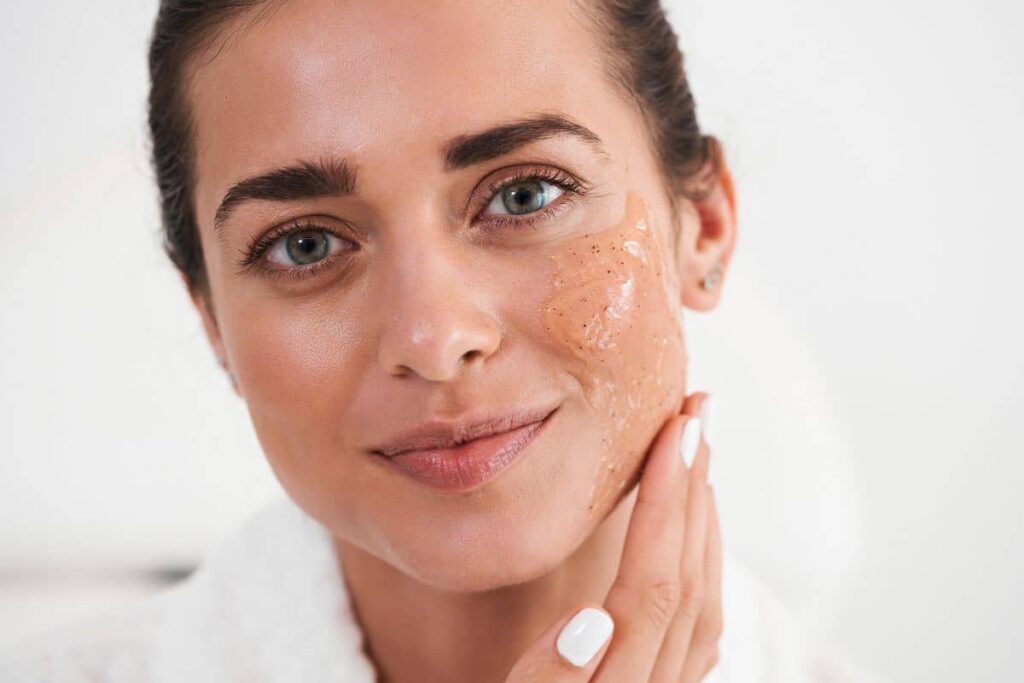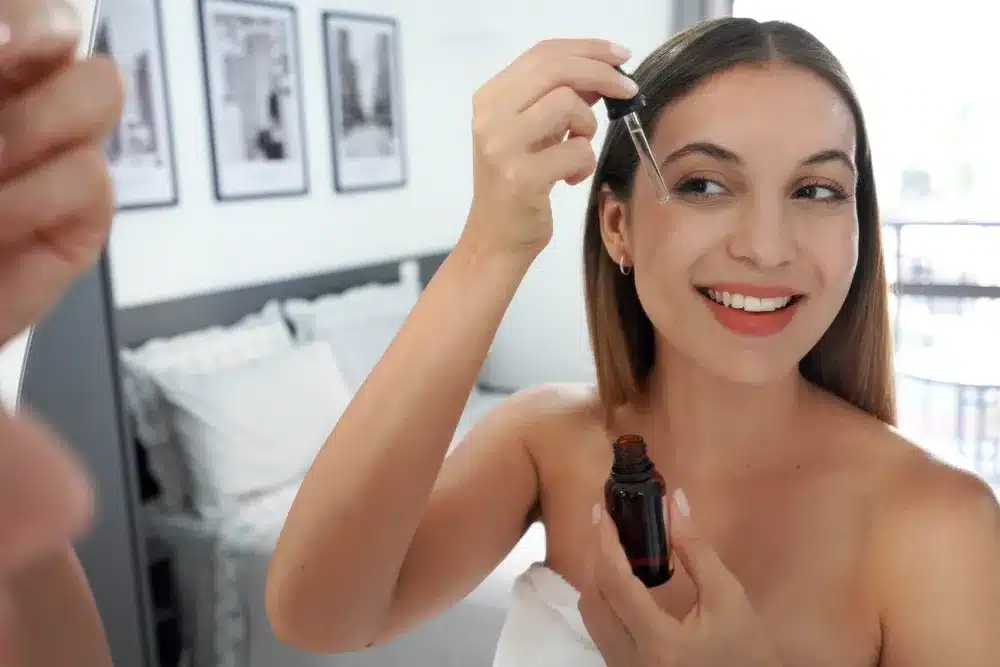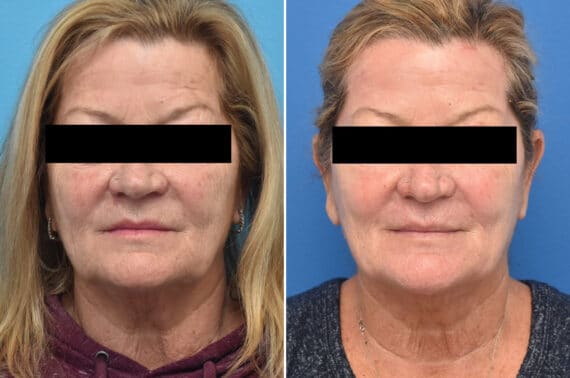Chemical peels refresh the skin; they remove dead cells, improve skin texture and reveal a brighter, smoother complexion. Only clinics once offered these treatments. However, more people are exploring how to do them safely at home.
At-home chemical peels address mild concerns, for example, dullness, clogged pores, or uneven tone. Strong peels or those that address deeper skin problems still need supervision from a professional.
At Becker Plastic Surgery, our licensed aesthetic providers offer medical-grade chemical peels tailored to each patient’s skin type and goals. In this guide, we’ll walk you through what’s safe to do at home, when to seek professional care, and how to get the best results without compromising your skin’s health.

Performing a Chemical Peel at Home: What You Should Consider Before Trying
- At-home chemical peels safely treat mild skin concerns; they use low-strength acids, such as glycolic, lactic, salicylic, or mandelic acid. Fruit enzymes also serve this purpose.
- Licensed professionals alone should apply stronger peels, for example, TCA and phenol. These treatments reach deeper into the skin and carry potential risks.
- Always choose a peel that matches your skin type, and follow instructions carefully after doing a patch test.
- Skincare specialists suggest professional peels for deep wrinkles, acne scars and melasma. Such treatments also produce noticeable anti-aging effects.
- When a person has sensitive skin or complex concerns, consult a qualified provider. This helps to provide safe and effective treatment.
Understanding How Chemical Peels Work
Chemical peels apply acid solutions to exfoliate skin; they remove damaged cells from the surface and encourage new cells to grow. The acid type determines a peel’s depth and intensity.
- Superficial peels remove the top layer; they serve well for mild concerns such as dullness or uneven texture. Because of this, people can use them at home.
- Medium and deep peels go further into the skin; they treat problems such as scars, deeper wrinkles and persistent dark spots. A licensed professional must always perform these procedures.
Selecting the correct peel rests on your skin type, your goals, along your experience level. Deep skin concerns or potent treatments require professional advice.
Benefits of At-Home Chemical Peels
Properly used, at-home chemical peels provide many benefits for clear, healthy skin:
- Improve overall skin texture and smoothness
- Help fade mild dark spots and discoloration
- Unclog pores and reduce minor breakouts
- Brighten dull or uneven skin tone
- Support long-term skin renewal when used regularly
At-home peels do not deliver the same dramatic results as clinical treatments. They are a valuable addition to a skincare routine; these basic peels are particularly good for preventative care or minor concerns.
Limitations of At-Home Peels
- Mild Formulas, Modest Results
Commercial peels contain a low acid content; they commonly have 30 % or less glycolic acid or salicylic acid at 2 %. Such peels address surface skin problems. However, they do not produce the deeper, more significant changes that professional peels provide. - Limited Depth
The peels act only on the outer layer of skin; they do not work on deeper wrinkles, on acne scars, or on advanced pigmentation. - Risk of Irritation
Applying too many peels or combining them with active ingredients such as retinoids may cause redness. Skin may also peel or burn, even when using mild acids. - Not Ideal for All Skin Types
If skin is sensitive, reactive, or darker, a person may experience post-inflammatory hyperpigmentation or irritation. Expert guidance prevents this. - One-Size-Fits-All Approach
At-home products do not fit the particular needs of your skin. A dermatologist or a licensed provider designs professional treatments for your skin.
What Chemical Peels Can You Safely Do at Home?
When you plan a chemical peel at home, pick effective and gentle products. The safest home peels use mild acids; these acids work on surface skin problems, such as dullness, clogged pores, or uneven color. They do not need a doctor’s supervision. Below are the best options to consider.

Glycolic Acid Peels
Glycolic acid is a common ingredient in at-home peels. It is an alpha-hydroxy acid (AHA) with small molecules that allow it to enter the skin. At low concentrations, about 10% – 30 %, it removes dead skin cells, softens rough texture, brightens skin color and helps collagen grow. If a person is new to peels, they should begin with a low-strength, over-the-counter glycolic peel. Use it little by little to prevent skin irritation.
Lactic Acid Peels
Lactic acid, an AHA, works gently and hydrates. People with sensitive or dry skin often use it. Lactic acid improves skin tone and texture; it also brightens areas that lack brightness and lessens slight pigmentation or rough spots. Lower concentrations, from 10% – 40%, generally cause no problems but also work well with regular use.
Salicylic Acid Peels
The acid works well for skin with oil or acne. Salicylic acid is a BHA that goes into pores; it breaks down extra oil, clears pores and lowers breakouts and blackheads. For home treatments, salicylic acid peels come in concentrations from 10% – 30 %. These peels help control blackheads and visible blockages.
Mandelic Acid Peels
Mandelic acid, a larger AHA, acts gently and works well, especially for skin prone to acne or skin with more pigment. It removes a small amount of dead skin cells, stops the growth of some bacteria, and helps skin appear clearer, smoother and more even in color over time. With a slower penetration than glycolic acid, it causes less irritation.
Fruit Enzyme Peels
Enzyme peels use natural exfoliants from fruits like papaya, pineapple, and pumpkin. These enzymes help dissolve dead skin cells without disrupting the deeper layers of the skin. They’re a good option for sensitive skin or anyone new to exfoliation. While the results are more subtle than acid-based peels, they can leave the skin looking smoother and more refreshed with minimal risk.
Chemical Peels Patient Results
* All patients are unique and individual results may vary.
How to Do a Chemical Peel at Home?
Home chemical peels assist your skincare routine, but they require careful application. These are the main safety steps to follow before, during and after applying a peel.
Before the Peel
1. Choose the Right Peel for Your Skin
Look into kinds of acids like glycolic, lactic or salicylic. Select an acid that matches your skin type and concerns. Use trusted brands, particularly if you have not used peels before. Do not use high concentrations; a 10 – 30 % concentration works as a safe start for most at-home products.
2. Stop Using Strong Actives
Pause products like retinoids, exfoliating scrubs, or anything irritating at least 2–3 days before your peel. This helps reduce the risk of over-sensitizing your skin.
3. Always Do a Patch Test
Put a small amount of the product on a part of your skin, such as your jawline or the inside of your arm. Wait 24 hours; then check for redness, itching, or irritation. After confirming no reaction, put the product on your face.
During the Peel
4. Follow Instructions Exactly
Every peel is different. Read product instructions carefully. Adhere to the recommended application time. That time is usually a few minutes. Do not go over the suggested time. This applies even if you feel no tingling.
5. Apply a Thin, Even Layer
With a cotton pad or clean fingertips, spread a thin layer of the peel over your skin. Do not put it near your eyes, lips, or on skin that is cut or irritated.
6. Rinse Thoroughly (If Required)
Some peels stay on the skin. Other peels need water for rinsing or neutralization after a few minutes. Check the product’s directions to avoid burns or lasting irritation.
After the Peel
7. Moisturize Gently
Apply a gentle cream without scent following the peel. This calms the skin and keeps the moisture barrier. For the next two days, omit ingredients such as acids or retinol.
8. Avoid Sun Exposure
After a peel, skin becomes sensitive to UV rays. Put on broad-spectrum sunscreen with at least SPF 30 daily. For three to five days, stay out of direct sun, particularly right after the treatment.
9. Skip Makeup Temporarily
Do not wear makeup for at least 24 hours after your peel. Wait longer if your skin stays red or peels. Allowing your skin to breathe helps with healing. This also lowers the chance of irritation or pores that clog.
10. Don’t Pick or Reapply Too Soon
Let your skin naturally shed; don’t scrub, pick, or peel flaking skin. Also, wait at least a week (or more, depending on the product) before doing another treatment.
Risks of At-Home Peels
Chemical peels at home improve skin. But they also bring risks, especially with incorrect use. Below are the common problems.
- Irritation and Redness
Mild tingling is expected, but burning, stinging, or swelling may signal overuse or sensitivity. - Chemical Burns
Leaving a peel on too long or using a high-strength formula without experience can cause burns or raw skin. - Dark Spots (Post-Inflammatory Hyperpigmentation)
Some skin types, especially medium to dark tones, are prone to discoloration if the skin becomes inflamed. - Breakouts or Purging
Peels cause breakouts sometimes, especially salicylic acid peels. Persistent irritation means it does not suit your skin. - Allergic Reactions
Perfumes or preservatives in a product cause rashes or itching. Apply a small amount of product on the skin to test it before you use it. - Delayed Healing
Over-exfoliating or skipping moisturizer can slow down recovery and weaken your skin barrier.

Struggling with Signs of Facial Aging?
Experience world-class treatment from our top-rated providers at Becker Plastic Surgery.
When Should You See a Professional for a Chemical Peel?
At-home peels help with mild skin issues. Some conditions, however, need a professional chemical peel. Consider talking to a licensed skin care provider in these situations:
- Deep Wrinkles, Scars, or Loss of Elasticity
Dark spots and melasma need a specific treatment plan and careful application. Professionals use medium to deep peels to address these skin problems. Such peels also reduce the chance of uneven skin color. - Severe Hyperpigmentation or Melasma
Stubborn dark spots and melasma need custom treatment and careful application. Professionals use medium to deep peels; these peels treat the issues and reduce the risk of uneven pigmentation.
- Complex Acne Scarring
Professional peels can help stimulate collagen and improve the texture of pitted or raised acne scars. These are often combined with other treatments like microneedling or laser therapy for better results. - Sensitive or Reactive Skin
If your skin is easily irritated, prone to redness, or has an existing condition like rosacea or eczema, a professional can guide you toward the safest, most appropriate peel or recommend alternatives altogether.
- Preparing for a Special Event
For a peel before a wedding or large event, time and strength are important. A professional helps you get good results without skin irritation or flaking near the date. - Advanced Results or Combination Treatments
To achieve more dramatic results, professionals may combine chemical peels with other therapies (like lasers, injectables, or prescription skincare), something that cannot be done safely at home.
At-Home Peels vs. Professional Peels
| Feature | At-Home Peels | Professional Peels |
|---|---|---|
| Strength | Mild (typically ≤30% AHA/BHA) | Medium to Deep (TCA, Phenol, stronger actives) |
| Depth | Surface-level (epidermis) | Can reach deeper layers of skin |
| Concerns Treated | Dullness, uneven tone, mild breakouts | Scars, deep wrinkles, melasma, and advanced aging |
| Application | Self-applied at home | Performed in a clinical setting by trained providers |
| Customization | One-size-fits-all products | Tailored to your skin type and concerns |
| Downtime | Minimal to none | Varies; can include redness, peeling, and recovery time |
| Safety | Safe when used correctly, but risk of misuse | Supervised, with lower risk when done by experts |
| Results | Gradual improvements over time | Faster, more noticeable results after fewer treatments |
Why Choose Becker Plastic Surgery for Professional Peels?
- Trusted, Patient-Focused Care
Known for customized service and consistent results, Becker is a trusted destination for professional-grade skin treatments. - Personalized Treatments
Chemical peels are tailored to your skin type and goals, targeting concerns like sun damage, fine lines, and uneven tone. - Experienced Aesthetic Nurses
Skilled RNs, including Samantha Berry, Brooke Carrero, Clai Araya, and Marielle Roselli, bring advanced training in medical aesthetics. - Safe, Clinical Setting
All treatments are performed in a professional environment, ensuring precision, safety, and expert post-care guidance. - Science-Backed, Natural Results
The team combines medical knowledge with aesthetic insight to deliver effective, skin-safe outcomes. - Convenient New Jersey Locations
Becker Plastic Surgery offers chemical peels at multiple locations across New Jersey, making expert care accessible and local.
Should You Do a Chemical Peel at Home?
At-home chemical peels offer a way to refresh skin. Choose them with care and apply them correctly; they work for mild concerns like dullness, uneven tone, or clogged pores.
However, for deeper wrinkles, stubborn pigmentation, or sensitive skin, a professional peel offers stronger results and medical-grade precision.
Not sure where to start?
In New Jersey and Philadelphia, the team at Becker Plastic Surgery offers customized chemical peels in a clinical setting. With experience, they care for your skin for a subtle glow or a deeper skin transformation.
Schedule a consultation today and take the next step toward healthier, radiant skin.
